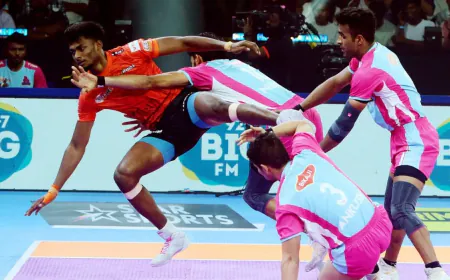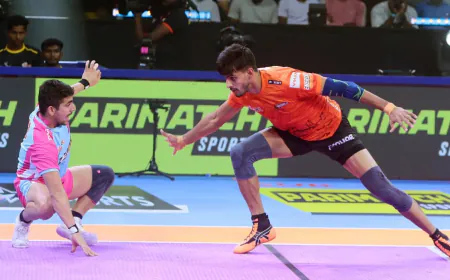BCCI Enhances the Role of the Fourth Umpire in IPL 2025
The BCCI has widened the roles of the fourth umpire during IPL 2025 in a bid to promote better decision-making and raise match monitoring levels. The initiative seeks to maximize gameplay, diminish controversy, and aid on-field and TV umpires in cases involving important judgment.

The Board of Control for Cricket in India (BCCI) has brought about some serious changes to the Indian Premier League (IPL) rules, especially concerning the fourth umpire's role and jurisdiction. The changes are focused on improving better match management, fair play, and rule-following, and making the umpire more critical in enforcing discipline on and off the field.
One of the most significant shifts is the rigid protocol that squads are not supposed to approach the fourth umpire with complaints over decisions. This instruction was reaffirmed again during the recent Captains' Meeting at the Cricket Centre, where BCCI authorities explained that the fourth umpire should be left alone in the performance of their duties.
Enhanced Responsibilities of the Fourth Umpire
The new rule entrusts the fourth umpire with more responsibilities outside of the traditional call. One of those important responsibilities these days includes random checks of bats for verification of compliance with parameters of size and weight. While in other seasons this check would be restricted only to the days of play, this time round it shall encompass practice too. The precaution means all the batsmen who enter play in the IPL comply with the standard dimensions, giving none a means to acquire unfair leverage.
Also, the fourth umpire is responsible for keeping a close watch on players who retire to the dugout, especially bowlers who retire from the field after bowling their overs quota. The BCCI has also noticed a trend of players regularly retiring from the ground for rest, which may result in possible misuses of rules of substitution. With observation of such movement, the fourth umpire will ensure that no team is provided with any undue advantage.
Additionally, the fourth umpire would serve as an emergency third umpire where necessary, to provide uninterrupted officiating in the event of technical failure or unanticipated events. They would also serve to assist match operations by having charge of a box filled with at least six fresh balls and maintaining vigilance over their choice whenever necessary.
Amended Rules for Conduct of a Match
Aside from redefining the role of the fourth umpire, BCCI has introduced various new rules to justify match proceedings and preserve justice in the IPL:
Completion of the 20th Over
A significant change has been introduced in the matter of innings completion time. In contrast to the ICC playing conditions, which take into account the time elapsed until the start of the 20th over, the IPL now requires the whole innings, including the completion of all 20 overs, to be completed within the given time. This is sure to promote quicker over rates and avoid unnecessary delays.
Retired Out, Super Over, and DLS Adjustments
The BCCI has explained how a retired-out batsman would be included in rain-affected matches. When a batsman retires and doesn't come back to bat, he will be treated as a dismissed player while calculating Duckworth-Lewis-Stern (DLS) so that the match outcomes are balanced.
Injury management has also been addressed, particularly concussions. The sides can now use a like-for-like substitute from the listed players. In case the wicketkeeper is concussed, the side can make use of a substitute from the squad. But if a foreigner is concussed and four foreign slots have already been used by the side, the substitute should be an Indian one from among the listed substitutes. This clause prevents teams from receiving a subconscious benefit from substituting a foreign player with a foreign replacement. Time-Out Notification Protocol
The BCCI has come up with a formal structure for dealing with time-out notices.
The captain or field batsmen alone are entitled to request a batting time-out. When the wicketkeeper requests a time-out, it will override any request made by the off-field captain. Team coaches on behalf of the absent captain may request a time-out through the fourth umpire in an effort to clarify and prevent confusion. Toss and Team Sheet Procedures
The second substantial update addresses the submission of the team sheet.
As opposed to the past when team sheets were exchanged prior to the toss, under the new system, the captains will be handed one sheet for both the batting and bowling teams. Once they agree on the toss result, they will present the team sheet to the match referee. The team managers will also exchange the sheets and send the rest to the Assistant Venue Manager so that the required documentation is completed. Impact on IPL 2025
These are considerable steps to improve the working mechanism of the IPL. By delegating power to the fourth umpire, the BCCI wants to better regulate the matches, reduce conflicts, and maintain the integrity of the tournament. With equipment, players, and match timetables under strict observation, the league is bound to run smoother and more justly, and provide a better experience for players and spectators as well.
The added duties assigned to the fourth umpire are a testament to the improvement of standards in officiating cricket today. With advancing technology and enhanced rule enforcement, the BCCI is recharting the IPL as a world-class cricketing spectacle that reaches the pinnacle of professionalism and competitiveness.





















































